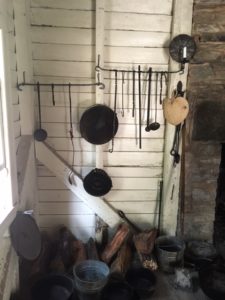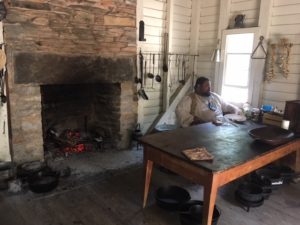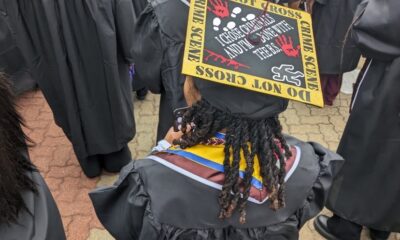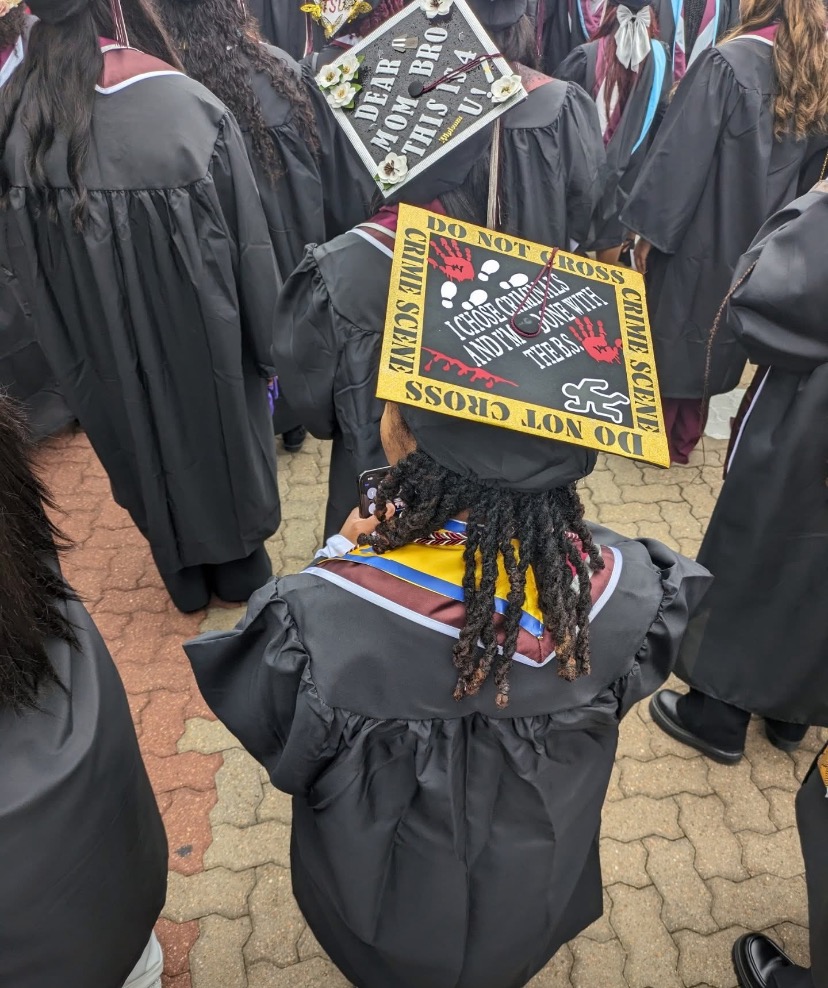“You need fiber, leave in the stem.”
“Cut the greens thin.”
In a robust voice that seemed unaffected after hours in temperatures that topped 115 degrees and more, author and chef Michael W. Twitty gave instructions to his helpers as they cooked using an open fire, wood and 19th century tools in a detached kitchen on an 1860s farmstead.
Twitty was a special guest for the Juneteenth celebration Sunday afternoon at the Atlanta History Center in Atlanta’s Buckhead community.
 The history museum and research center hosted a free two-day lineup of family programs, activities and performances to commemorate African Americans’ second Independence Day, which began on June 19, 1865 when the abolition of slavery was announced in Texas — the last state in rebellion after the end of the Civil War.
The history museum and research center hosted a free two-day lineup of family programs, activities and performances to commemorate African Americans’ second Independence Day, which began on June 19, 1865 when the abolition of slavery was announced in Texas — the last state in rebellion after the end of the Civil War.
The Center brought in Twitty to speak on African and African American food traditions in Southern barbecue as well as to do cooking demonstrations.
But, Twitty readily pointed out, he wasn’t there to put on a show, but rather to teach the history of American foodways, which has its roots in African culture.
Still, he was concerned. If the visitors were expecting to see some authentic recreation of the type of food black people ate during slavery, they would be disappointed.
“Authenticity is relative,” Twitty said, adding that what they were doing had very little to do with how they ate in the 1860s. “It’s never gonna be like that.”
Also, he added, “My goal is never to cook anything that is not seasonal. Fresh meat consumption was extremely low for black people during slavery time.”
In fact, enslaved people rarely—if ever—ate so well. On Sunday, Twitty and staff members as well as volunteers from the museum, made barbecue ribs, chicken, dumplings dipped in cooked blueberries, sweet potato and greens plucked from the museum’s garden.
During slavery times, they would often eat the entrails and internal organs of the animal, according to an article featuring Twitty in Garden & Gun magazine. They would eat pig feet, chitlins, chicken feet, hog maws, hog’s head, and pig ears. Sometimes they ate the game they caught: possum and raccoon and squirrel and quail and deer and sometimes even rats, according to the article.
These stories are often never told. Twitty said African Americans know little of the origins of much of their foodways and folkways. He blames that on white supremacy and what it teaches: “The idea that we’ve contributed very little,” Twitty said.
But Twitty, who is also an historian and teacher, said the truth is found in the history and origin of American foodways.
“I want them to know that we have a proud culinary history; that we came from something, from somebody,” Twitty said.
 Twitty, who is 40, grew up hearing the stories of what his ancestors endured. His maternal grandmother told him how her parents would miss out on a meal at least once a week so they could feed their seven children.
Twitty, who is 40, grew up hearing the stories of what his ancestors endured. His maternal grandmother told him how her parents would miss out on a meal at least once a week so they could feed their seven children.
He remembers cooking side by side with his mother and grandmother while growing up in Washington, D.C., and though he disliked Southern fare (black-eyed peas, collard greens, okra) he said he soon grew to love it.
And in his 20s began experimenting with different foods. On Sunday, he shared some of what he learned.
Despite the heat, dozens came into the kitchen to hear Twitty, author of The Cooking Gene: A Journey Through African American Culinary History in the Old South and winner of the 2018 James Beard award.
Some like Kara Hudson and her husband stayed a while although their clothes, wet with sweat, clung to their bodies.
“It’s just fascinating,” said Hudson who follows Twitty on Facebook and Twitter and reads all his blogs. “African foodways, Caribbean foodways, southern foodways, all things that is American foodways, it’s just fascinating to see all of that being recognized.”
On his blogs—Afroculinaria and The Cooking Gene—he writes about his obsessions with the roots of African American and Southern food history as well as his personal journeys.
He writes about his Southern Discomfort Tour, a series of trips in the South to uncover overlooked, underappreciated, and sensitive historical truths, according to Garden & Gun. To his “fellow African Americans,” he writes, “We complain a lot when sites and shows and movies and the like don’t reflect our history or experience. We want them to tell it like it is…but many of my colleagues have complained that so often we don’t empower each other to tell our own stories,” according to the article.
On Sunday, Twitty said he was happy to see many of his people.
“They gave me energy,” said Twitty, who after a two-hour preparation, began cooking from noon and continued until four o’clock that afternoon. “I like it when black people bring their children.”
Twitty used the occasion to talk about the struggles of enslaved African Americans who used their skills and abilities in cooking to survive. But when he starts talking about slavery, he’s disappointed to see many of them quickly leave while most of the white visitors remain. Still, he understands why so many African Americans tend to evade the subject. It’s too difficult, too painful for them.
“A lot of people just don’t know how to talk about it,” Twitty said, adding that most African Americans grew up in homes that never touched the topic.
But Twitty doesn’t let their reluctance stop him. He has a message to deliver, he said, as he continued working in the kitchen under conditions similar to what enslaved black people endured on a daily basis for centuries.
“You come from kings and queens, people who built this country,” Twitty said. “People who lived this life, did this so you can have a nice life, have good things. They also did this so we could hold our heads high.”


 Black History5 years ago
Black History5 years ago
 Black History6 years ago
Black History6 years ago
 Black History4 years ago
Black History4 years ago
 Black History5 years ago
Black History5 years ago
 Black History5 years ago
Black History5 years ago
 Black History6 years ago
Black History6 years ago
 Black History9 years ago
Black History9 years ago
 Black History5 years ago
Black History5 years ago
 The history museum and research center hosted a free two-day lineup of family programs, activities and performances to commemorate African Americans’ second Independence Day
The history museum and research center hosted a free two-day lineup of family programs, activities and performances to commemorate African Americans’ second Independence Day Twitty, who is 40, grew up hearing the stories of what his ancestors endured. His maternal grandmother told him how her parents would miss out on a meal at least once a week so they could feed their seven children.
Twitty, who is 40, grew up hearing the stories of what his ancestors endured. His maternal grandmother told him how her parents would miss out on a meal at least once a week so they could feed their seven children.

























